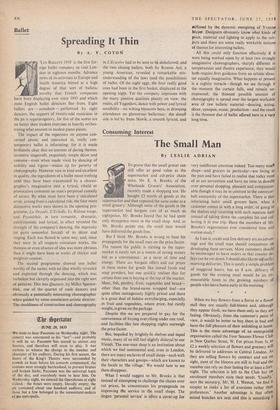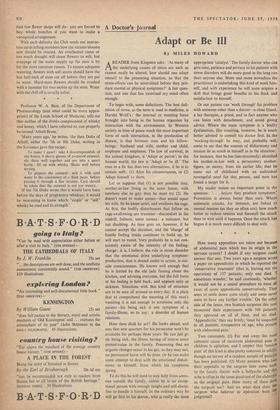Consuming Interest
The Small Man
By LESLIE ADRIAN To prove that the small grocer can still offer as good value as the supermarket and cut-price chain store, Mr. E. A. Brooks, of the Wholesale Grocers' Association, recently made a shopping test. He bought £3 worth of goods at the supermarket and then repeated the same order at a small grocery. Although some of the goods in the supermarket had bargain cuts of as much as eightpence, Mr. Brooks found that he had spent only threepence more in the small shop. And, as Mr. Brooks points out, the small man would have delivered the goods free.
But l think Mr. Brooks is wrong to base his propaganda for the small man on the price factor. The reason the public is turning to the super- market is surely not as a means of saving money but as a convenience : as a saver of time and energy. There are bargain offers and cut prices in these stores for goods like tinned foods and soap powders, but one quickly realises that for certain lines one is buying at the top of the market. • Meat, fish, pbultry, fruit, vegetables and bread— other than the brand-name wrapped loaf—are quite often outrageously highly priced and there is a great deal of hidden overcharging, especially in fruit and vegetables, where price, but rarely weight, is given on the package.
Despite this we are prepared to pay for the convenience of buying everything under one roof, and facilities like late shopping nights outweigh the price factor.
But, beguiled by brightly-lit shelves and taped music, many of us -gill feel slightly disloyal to our friends. The one-man shop is an institution about which we feel sentimental and, even in London, there are many enclaves of small shops—each with their characters and gossips—which are known to the locals as 'the village.' We would hate to see them disappear.
What I would suggest to Mr. Brooks is that instead of attempting to challenge the chains over cut prices, he concentrates his propaganda on improving the service in the small shops. The slogan 'personal service' is often a cover-up for very indifferent attention indeed. Too many small shops—and, grocers in particular—are living in the past and have failed to realise that today most of us are servantless and have no time to dawdle over personal shopping, pleasant and companion- able though it may be in contrast to the conveyor- belt anonymity of the supermarket. There is that infuriating habit small grocers have, when a customer conies in with a long order, of going to the shelves and returning with each separate item instead of taking down the complete list and col- lecting it in one trip. Have the members of Mr. Brooks's organisation ever considered time and motion study?
As I see it, credit and free delivery are an advan- tage and the small man should concentrate 00 developing these services. More customers should be encouraged to leave orders so that counter de- lays can be cut down. I should also like to see early- morning deliveries. This is surely a simple problem of staggered hours, but an 8 a.m. delivery of goods for the evening meal would be an im- measurable boon to the growing numbers of people who leave home early in the morning.
*
When we buy flowers from a florist or a flower stall they are usually full-blown and, although they appear fresh, we have them only as they are fading. Obviously, from the customer's point of view, it would be better to buy them in bud and have the full pleasure of their unfolding at home. This is the main advantage of an enterprising organisation called the Four Seasons Flower Club in New Quebec Street, W. For prices from Ss. to £2 a weekly selection of flowers and greenery will be delivered to addresses in Central London. AS they are selling flowers by contract and not on sight, most of the blooms are still in bud and the member can rely on their lasting for at least a fort- night. The selection is left to the Club but one enrolment members state their needs. 'Usually, says the secretary, Mr. M. J. Weston, 'we find it simpler to make a list of aversions rather than preferences.' Another advantage is that often mixed bunches are sent and this is something I find few flower shops will do: you are forced to buy whole bunches if you want to make a variegated arrangement.
With each delivery the Club sends out instruc- tion cards telling members how the various blooms sent should be treated. An overheated room or too much draught will cause flowers to wilt, but stoppage of the water supply up the stem is by far the most common reason. To ensure adequate watering, flowers with soft stems should have the last half-inch of stem cut off before they are put in water. Hard-stem flowers should be crushed with a hammer for two inches up the stem. Water with the chill off is usually safest.
Professor W. A. Bain, of the Department of Pharmacology (and what could be more appro- priate) of the Leeds School of Medicine, tells me that neither of the drinks compounded of whisky and honey, which I have referred to, can properly be termed 'Athol' Brose.'
`Many years ago,' he writes, 'the then Duke of Athol!, either the 7th or 8th Duke, writing in the Scotsman gave this recipe :
To make I quart': take 4 dessertspoonfuls of run honey, 4 sherry glasses of prepared oatmeal, stir these well together and put into a quart bottle: till up with whisky. Shake well before serving.
To prepare the oatmeal: mix it with cold
water to the consistency of a thick paste, before passing it through a fine strainer. Care should be taken that the oatmeal is not too watery. `If the 7th Duke wrote this it would have been before the days of proprietary whiskies; it would be interesting to know which "single" or "self" whisky he used and its strength.'



































 Previous page
Previous page